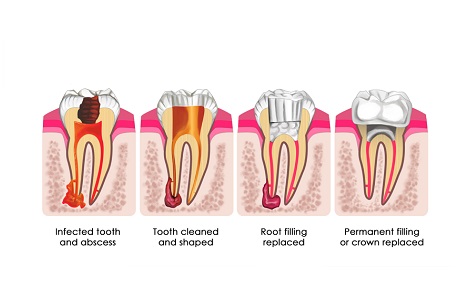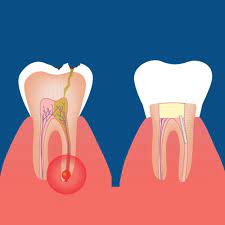Root canal treatment is a dental procedure that is commonly performed by dentists and endodontists to treat infected or inflamed pulp within a tooth. While it may sound like a daunting procedure, understanding what it involves can help alleviate any fears or concerns you may have. In this article, we’ll discuss what a root canal treatment involves, when it’s necessary, and the benefits of the procedure.
What is a Root Canal Treatment?
The term “root canal” refers to the natural cavity within the centre of a tooth that contains the pulp. The pulp is a soft tissue that contains nerves, blood vessels, and connective tissue. When the pulp becomes infected or inflamed, it can cause severe pain and discomfort. A root canal treatment is a procedure that involves removing the infected or inflamed pulp from the tooth. Additionally, it involves cleaning and sealing the tooth to prevent further damage or infection.

A root canal treatment is typically performed over two visits. The dentist or endodontist will first numb the area around the affected tooth with a local anaesthetic before treatment. They will then create a small opening on the top of the tooth. This is used to access the pulp chamber and root canals.
Using small instruments, the dentist or endodontist will remove the infected or inflamed pulp from inside the tooth and clean the root canals. The cleaning helps remove any bacteria or debris. Once the canals are cleaned, the dentist will fill them with a biocompatible material. The dentist then seals the opening in the tooth with a filling or crown.
When is a Root Canal Treatment Necessary?
A root canal treatment is necessary when the pulp inside a tooth becomes infected or inflamed. There are several reasons why the pulp may become damaged, including:
- Deep decay: If tooth decay is not treated, it can spread to the pulp and cause an infection.
- Trauma: A tooth that has been cracked or chipped may expose the pulp and cause an infection.
- Repeated dental procedures: Repeated dental procedures on a tooth can irritate the pulp and cause it to become inflamed.
- Gum disease: Advanced gum disease can cause the gums to pull away from the teeth. This may result in exposing the roots and allowing bacteria to enter the pulp.
If left untreated, an infected or inflamed pulp can cause serious health problems. Such problems include a dental abscesses, bone loss, or even systemic infections. Signs that you may need a root canal treatment include severe tooth pain and sensitivity to hot or cold temperatures. Moreover, other signs include swollen or tender gums, darkening or discolouration of the tooth, or a persistent pimple on the gums.
What are the Benefits of a Root Canal Treatment?
The benefits of a root canal treatment are many. By removing the infected or inflamed pulp, the procedure can:
- Save the affected tooth from extraction: One of the main benefits of a root canal treatment is that it can save a damaged or infected tooth from being extracted. Losing a tooth can cause many problems. These are difficulty chewing and speaking, changes in bite alignment, and bone loss in the jaw.
- Relieve pain and discomfort caused by the infection or inflammation: Infected or inflamed pulp can cause severe pain and discomfort. By removing the pulp, a root canal treatment can alleviate these symptoms. This helps restore your quality of life and makes your life more enjoyable.
- Prevent the spread of infection to other teeth and gums: If left untreated, an infected tooth can spread the infection to other teeth and gums. This can cause even more damage and pain. By treating the infection with a root canal, you can prevent it from spreading and causing more damage.
- Restore the function and appearance of the affected tooth: A tooth that has undergone a root canal treatment can function just like any other tooth. By restoring the tooth’s function and appearance, the procedure can improve your overall oral health and well-being.
What to Expect During a Root Canal Treatment
If you’re scheduled for a root canal treatment, it’s normal to feel anxious or nervous about the procedure. However, knowing what to expect can help alleviate any fears or concerns you may have. Here’s what you can expect during a root canal treatment:
- Consultation and examination: Before the procedure, your dentist or endodontist will examine your tooth physically using dental tools. He will also take X-rays to determine the extent of the damage and whether a root canal treatment is necessary.
- Numbing the area: Your dentist or endodontist will use a local anaesthetic to numb the area around the affected tooth. You may also be given a sedative to help you relax.
- Accessing the pulp: Once the area is numb, your dentist or endodontist will create a small opening in the top of the tooth. The opening is used to access the pulp chamber and root canals.
- Removing the pulp: Using small instruments, your dentist or endodontist will carefully remove the infected or inflamed pulp from inside the tooth. They will then clean the root canals to remove any bacteria or debris.
- Filling the canals: Once the canals are cleaned, your dentist or endodontist will fill them with a biocompatible material. We usually use gutta-percha, to prevent further infection or damage.
- Sealing the tooth: After the canals are filled, your dentist or endodontist will seal the opening in the tooth with a filling or crown. If a crown is necessary, your dentist will take an impression of your tooth to create a custom crown that fits perfectly.
- Follow-up appointment: In most cases, a follow-up appointment will be scheduled. This is done to ensure that the tooth is healing properly and to place a permanent crown if necessary.
After the procedure, it’s normal to experience some discomfort or sensitivity in the treated tooth. This can be managed with over-the-counter pain medication. Your dentist or endodontist may also recommend avoiding hard or crunchy foods and chewing on the treated tooth for a few days to allow it to heal properly.
In rare cases, complications may occur after a root canal treatment. These may include a cracked or damaged tooth, infection, or persistent pain. If you experience any of these symptoms, it’s important to contact your dentist or endodontist right away. This might prove to be impactful in preventing further damage or infection.
In conclusion, a root canal treatment may sound daunting. However, it’s a common and effective procedure that can save a damaged or infected tooth and alleviate pain and discomfort. Knowing what to expect during the procedure can help ease any fears or concerns you may have. It also helps ensure a successful outcome. If you think you may need a root canal treatment, don’t hesitate to contact your dentist or endodontist to schedule a consultation. If you are looking for qualified and competent dental specialists, who offer quality services at affordable costs, look no further than the Nairobi Sterling Dental Clinic. It is a modern dental clinic, located at the Park Suite Building, in Parklands. Feel free to visit us at any time and consult with the best dental experts in town.

